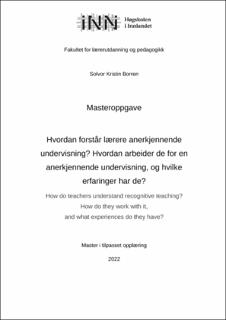Hvordan forstår lærere anerkjennende undervisning? Hvordan arbeider de for en anerkjennende undervisning, og hvilke erfaringer har de?
Master thesis
Permanent lenke
https://hdl.handle.net/11250/3019731Utgivelsesdato
2022Metadata
Vis full innførselSammendrag
Norsk SammendragMasteroppgavens siktemål har vært å finne svar på hvordan lærere forstår, tilrettelegger og har erfart anerkjennelse i sitt arbeid med elever, samt betydningen av anerkjennelse for elevers utvikling og læring. Tilnærmingen er gjort via Axel Honneths anerkjennelsesteori, og problemstillingen lyder: Hvordan forstår lærere anerkjennende undervisning? Hvordan arbeider de for en anerkjennende undervisning, og hvilke erfaringer har de? Kristiansen (2017, s.18) skriver at Honneth har undersøkt hva anerkjennelse er, og utviklet en teori om anerkjennelse på bakgrunn av universell etikk. Honneths teori blir dermed å forstå som et allmenngyldig kompass for et moralsk samfunn.For å kunne besvare problemstillingen ble det foretatt fire kvalitativt semistrukturerte forskningsintervjuer med lærere på barnetrinnet. Prosessen har vært deduktiv og intervjuguiden ble skrevet med utgangspunkt i teorikapitlet. Intervjuguide og teori er bygget på Honneths sfærer kjærlighet, rettighet og solidaritet, supplert med annen relaterbar teori på feltet. Kategoriene fikk i analysen underkategorier utarbeidet på bakgrunn av informantsvar, en induktiv prosess.I drøftingen ses den teoretiske forankringen opp mot svarene i analysen, og jeg mener at mange av informantsvarene er forenlig med mye av det teoretiske materialet. Samtidig kan ikke informantenes anerkjennelse sies å gå i en bestemt teoretisk retning. Videre viser funn at Honneths sfærer ikke er å finne i praksis. Derimot finner jeg en todeling i læreres anerkjennende handling, en psykologisk og sosiologisk vinkling mot anerkjennelse for individ og gruppe. Funnene viser videre at problemstillingens innholdselementer forståelse, tiltak og erfaring i praksisfeltet blir som en syntese, eller et hjul, der elementene stadig utvikles. Det siste funnet dreier seg om tid, og informantenes opplevelse av mulighet for anerkjennelse. I tidsfaktoren ligger mange andre faktorer implisitt. Informantene mener mangel på tid skyver på deres mulighet til å opparbeide ekte relasjon til alle elever og ditto gruppekontakt. Engelsk sammendrag (abstract)The aim of this thesis is to explore how teachers understand, facilitate and have experienced recognition in their work with students. Moreover, this paper seeks to understand the importance of recognition for students’ development and health. The research question “How do teachers understand recognitive teaching? How do they work with it, and what experiences do they have?” is explored through the lens of Axel Honneths Theory of Recognition. Kristiansen (2017, s. 18) writes that Honneth has investigated what recognition is, and developed a theory of recognition on the basis of universal ethics. As a consequence, Honneths theory is understood as a universal compass for a society of moral.Four semi-structured, qualitative research interviews were conducted with primary school teachers, in order to answer the research question. The process has been decuctive. Furthermore, the interview guide was written based on the theory chapter. Both the interview guide and the theory chapter were based on Honneths spheres; love, rights and solidarity, and supplemented with other related theories in the field. As an inductive process in the analysis, the subcategories of the categories were made on the basis of the informants’ answers.In the discussion chapter, the findings of the analysis are discussed in light of presented theory. In my opinion, many of the informants’ answers are compatible with the theoretical material. However, the informant’s way of recognition can not be said to go in any specific theoretical direction. Furthermore, the findings of this paper shows the difficulty of finding Honneth’s spheres in practice. However, two different recognitive patterns of actions towards individuals and groups (a psychological and a sociological), are found. Furthermore, findings show that the content elements of the research question; how teachers understand, work and have experienced recognitive teaching, becomes a synthesis, or an ever-developing wheel of elements. The last finding is related to the informant’s experience of the opportunity to recognition (time is the factor). Many other factors exists implicitly in the time factor; the informants believe the lack of time challenges their ability to build a real relationship with all of the students (and thus their contact with the group).
